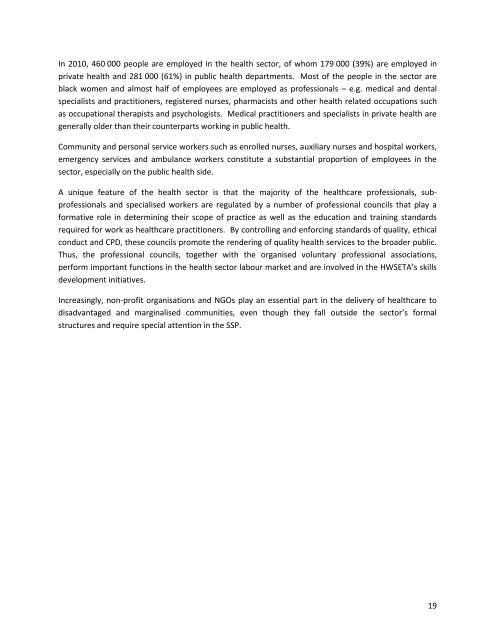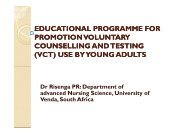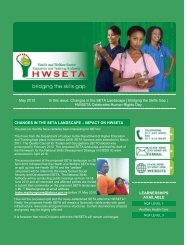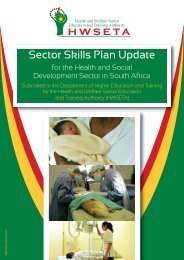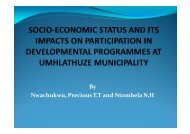sector skills plan for the health sector in south africa
sector skills plan for the health sector in south africa
sector skills plan for the health sector in south africa
Create successful ePaper yourself
Turn your PDF publications into a flip-book with our unique Google optimized e-Paper software.
In 2010, 460 000 people are employed <strong>in</strong> <strong>the</strong> <strong>health</strong> <strong>sector</strong>, of whom 179 000 (39%) are employed <strong>in</strong><br />
private <strong>health</strong> and 281 000 (61%) <strong>in</strong> public <strong>health</strong> departments. Most of <strong>the</strong> people <strong>in</strong> <strong>the</strong> <strong>sector</strong> are<br />
black women and almost half of employees are employed as professionals – e.g. medical and dental<br />
specialists and practitioners, registered nurses, pharmacists and o<strong>the</strong>r <strong>health</strong> related occupations such<br />
as occupational <strong>the</strong>rapists and psychologists. Medical practitioners and specialists <strong>in</strong> private <strong>health</strong> are<br />
generally older than <strong>the</strong>ir counterparts work<strong>in</strong>g <strong>in</strong> public <strong>health</strong>.<br />
Community and personal service workers such as enrolled nurses, auxiliary nurses and hospital workers,<br />
emergency services and ambulance workers constitute a substantial proportion of employees <strong>in</strong> <strong>the</strong><br />
<strong>sector</strong>, especially on <strong>the</strong> public <strong>health</strong> side.<br />
A unique feature of <strong>the</strong> <strong>health</strong> <strong>sector</strong> is that <strong>the</strong> majority of <strong>the</strong> <strong>health</strong>care professionals, subprofessionals<br />
and specialised workers are regulated by a number of professional councils that play a<br />
<strong>for</strong>mative role <strong>in</strong> determ<strong>in</strong><strong>in</strong>g <strong>the</strong>ir scope of practice as well as <strong>the</strong> education and tra<strong>in</strong><strong>in</strong>g standards<br />
required <strong>for</strong> work as <strong>health</strong>care practitioners. By controll<strong>in</strong>g and en<strong>for</strong>c<strong>in</strong>g standards of quality, ethical<br />
conduct and CPD, <strong>the</strong>se councils promote <strong>the</strong> render<strong>in</strong>g of quality <strong>health</strong> services to <strong>the</strong> broader public.<br />
Thus, <strong>the</strong> professional councils, toge<strong>the</strong>r with <strong>the</strong> organised voluntary professional associations,<br />
per<strong>for</strong>m important functions <strong>in</strong> <strong>the</strong> <strong>health</strong> <strong>sector</strong> labour market and are <strong>in</strong>volved <strong>in</strong> <strong>the</strong> HWSETA’s <strong>skills</strong><br />
development <strong>in</strong>itiatives.<br />
Increas<strong>in</strong>gly, non-profit organisations and NGOs play an essential part <strong>in</strong> <strong>the</strong> delivery of <strong>health</strong>care to<br />
disadvantaged and marg<strong>in</strong>alised communities, even though <strong>the</strong>y fall outside <strong>the</strong> <strong>sector</strong>’s <strong>for</strong>mal<br />
structures and require special attention <strong>in</strong> <strong>the</strong> SSP.<br />
19


